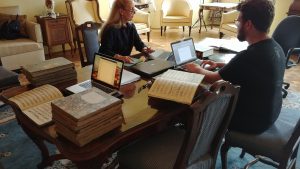This summer I traveled to the Czech Republic with Professor Libin and alumnus Joseph Gusmano to study the Lobkowicz music collection. The Lobkowicz family is a line of Bohemian nobility that dates back to the 14th century. They are known music lovers, especially the seventh Prince Lobkowicz (1772-1816), who spent exorbitant sums of money on performances, scores, and commissions, and was a patron of both Haydn and Beethoven. Our time was divided between cataloguing and cleaning the collection, and assisting Professor Libin with research for her biography of the seventh prince.
Our workplace, the Lobkowicz castle in Nelahozeves
Our first task was to digitalize the catalogue by inspecting each piece of music individually and recording its attributes, such as the title, composer, publisher, date, condition, and more, into a digital cataloguing program. We also cleaned the scores and moved them into new storage boxes. Cataloguing is a time-consuming process that has already been underway for a number of years, but we made substantial progress. This project brought us into contact with a wide variety of scores, both manuscript and printed, ranging from a string quartet arrangement of Haydn’s The Seasons to piano potpourris inspired by popular operas.
Our research on the seventh prince was centered around opera. The prince had a personal opera troupe that traveled with him to put on performances. We examined the parts used by this troupe, in an effort to find information about who was involved, and when and where they performed. This music was full of life, precipitating joyous discoveries; we became well acquainted with the lead singers who routinely wrote their names on their parts, and enjoyed lighthearted sketches made by bored instrumentalists.
The team hard at work studying opera parts
My experience with this project emphasized the importance of musicology in achieving a complete understanding of history. Music holds a wealth of information; it can reveal large-scale abstractions such as societal values, political ideals, and spiritual beliefs, while simultaneously providing an avenue into a personal, intimate dimension. The research we conducted on the Lobkowicz music collection provided invaluable nuance to our understanding of the family, transforming them from one-dimensional names on a page into living, breathing, and feeling human beings.


